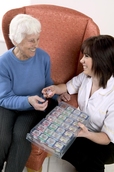Care home providers embrace new capabilities in medication compliance

Innovations in medication management, from Cheshire-based company Protomed, have attracted the attention of worldwide pharmacy group Alchem Healthcare.
The latest Biodose system, designed to provide carers with pre-measured solid and liquid medication, has enabled the healthcare group to attract prestigious care sector clients, recording thirteen new care home contracts within its first two years of offering the product.
Alchem’s regional Biodose coordinator, Vicky Moore, commented on the success of the venture: “Biodose gave Alchem pharmacies the opportunity to compete against several of the country’s biggest multiples and it has won us some phenomenal business. We are getting very positive feedback from our care home customers about the system and we are very excited about launching BeMAR throughout the group.
“Our care homes report their round times are greatly reduced now they no longer have to measure out their liquid specials as they are able to administer the Biodose pod at the same time as the rest of the oral medication.”
Benefits of the BeMAR (Biodose electronic MAR) include the ability to administer medication electronically via a wireless scanner synched to an iPad, and the scanning of barcodes as the medication is administered, helping to reduce round times while removing the reliance on an unreliable paper-based system.
The technology was successful trailed by Protomed at Manchester-based care home Flixton Manor, who recorded a seventy-five percent increase in medication efficiency as a result.
Protomed managing director Norman Niven spoke: “The effect BeMAR has had on productivity at Flixton Manor is a clear example of the difference cutting edge technology can make.
“The care industry must tap into the NHS’s technology agenda, and BeMAR is a vital step in that direction. Put simply, it will not allow the user to make a mistake – this is hugely compelling for care organisations striving to do more with less.”
Earlier this year joint research from the University of West England Bristol and the University of Warwick carried out a study of 345 care home residents and found that, over three months, a staggering 90 per cent of them were exposed to at least one error in medication administration.
The research also estimated that half of care home residents are at risk of serious errors and potential hospitalisation, a sad reality that is estimated to cost the NHS millions of pounds every year on subsequent treatment.
Latest News
 29-Jul-24
Dementia Bus gives carehome.co.uk staff insight into life with dementia
29-Jul-24
Dementia Bus gives carehome.co.uk staff insight into life with dementia
 01-Mar-24
Find out the top care homes in 2024
01-Mar-24
Find out the top care homes in 2024
 21-Mar-23
UK's top care homes in 2023 revealed
21-Mar-23
UK's top care homes in 2023 revealed
 03-Jan-23
carehome.co.uk launches free care helpline
03-Jan-23
carehome.co.uk launches free care helpline
 13-Dec-22
5 mins with Emily Whitehurst, chief operating officer for Constantia Healthcare
13-Dec-22
5 mins with Emily Whitehurst, chief operating officer for Constantia Healthcare